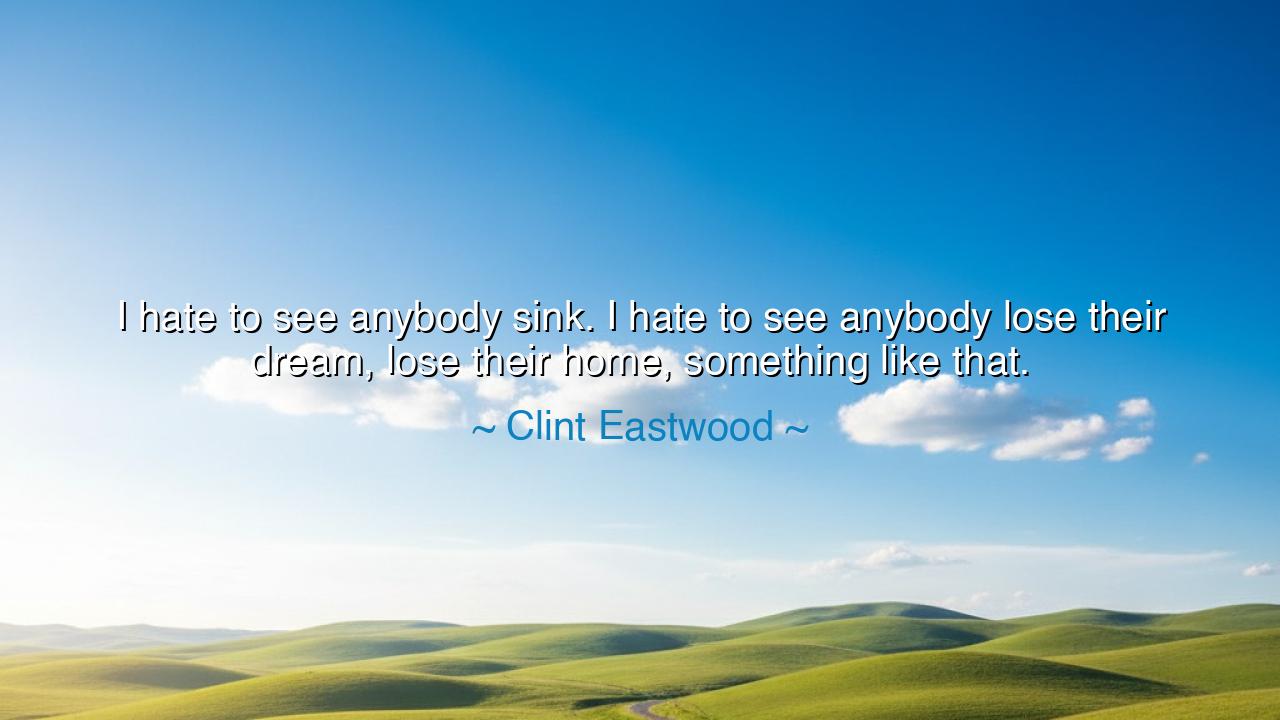
I hate to see anybody sink. I hate to see anybody lose their
I hate to see anybody sink. I hate to see anybody lose their dream, lose their home, something like that.






The legendary actor and storyteller Clint Eastwood, a man who has long embodied stoic strength and quiet compassion, once said: “I hate to see anybody sink. I hate to see anybody lose their dream, lose their home, something like that.” At first glance, these words seem simple — the sentiment of a man who empathizes with others’ pain. But beneath their plainness lies a depth of moral clarity, a wisdom carved by time and by life’s storms. It is the voice of one who has seen both triumph and despair, and who understands that dignity, not dominance, is the truest measure of a person. His words speak to the ancient virtue of compassion, the kind that sees another’s suffering as one’s own.
Clint Eastwood’s quote reveals the paradox of strength: that the strongest souls are not those who rejoice in others’ downfall, but those who ache to see anyone fall at all. The man known for portraying rugged loners and hardened heroes here speaks with tenderness — the kind of tenderness that only life’s hard lessons can teach. To “hate to see anybody sink” is to reject cruelty, envy, and indifference; it is to recognize that all people, even those we may not understand, carry within them a dream, a fragile spark that deserves respect. This is the wisdom of a man who has looked out over the landscapes of both victory and loss and found them to be part of the same horizon.
In the traditions of old, such compassion was seen not as weakness, but as greatness. The philosopher Marcus Aurelius, emperor of Rome and student of the Stoics, once wrote: “When you wish ill on another, you have already injured yourself.” Eastwood’s words breathe the same truth: that to rejoice in another’s fall is to poison the soul. The ancient warrior-kings, too, knew this. Alexander the Great, upon conquering the Persian king Darius, wept not from triumph but from sorrow — sorrow that a man once so mighty had been brought to ruin. True greatness, whether in emperor or everyman, lies in empathy — in the ability to see another’s pain and to wish for their restoration, not their destruction.
Eastwood’s compassion also springs from a deeply American understanding of the dream — the belief that every person deserves a chance to rise, to build, to belong. When he speaks of hating to see someone “lose their dream or their home,” he is mourning not just personal loss, but the unraveling of hope itself. For the home is more than wood and stone; it is the sanctuary of a person’s identity. And the dream — whatever form it takes — is the soul’s fire, the invisible thread that ties a person to meaning. When either is lost, something in the fabric of humanity tears. Eastwood’s heart, though shaped by grit, is gentle enough to feel that tear and lament it.
Consider the story of Abraham Lincoln, who, though known as a pillar of resolve, was deeply moved by compassion. During the Civil War, he received countless pleas from soldiers sentenced to death for desertion. Many of his generals urged firmness, but Lincoln, often in secret, granted pardons. “I hate to see a man lose his chance at life,” he said, much like Eastwood’s own words a century later. To both men, mercy was not naivety; it was moral courage. The great souls of history have always known that power without compassion corrodes, but compassion with power redeems.
There is also humility in Eastwood’s reflection — an acknowledgment that we are all vulnerable to the same fate. To see another “sink” is to be reminded of how easily we could fall ourselves. Pride blinds us to this truth, but wisdom opens our eyes. The ancients taught that fortune is fickle, that today’s victor may be tomorrow’s fallen man. In this light, compassion is not only virtue — it is survival. For when we lift others, we strengthen the very ground we, too, walk upon.
So, my listener, let Clint Eastwood’s words dwell in your heart as more than sentiment — let them become practice. When you see another falter, resist the instinct to judge or ignore. Instead, reach out, even in small ways — with encouragement, with generosity, with understanding. Celebrate others’ dreams as you guard your own, and help rebuild what has been lost, for in doing so you preserve the dignity of all. The strong do not trample the fallen; they extend a hand. The wise do not envy the dreamers; they protect their light. And the compassionate, as Eastwood reminds us, see no glory in another’s ruin — only sorrow, and the quiet resolve to make the world gentler than they found it.






AAdministratorAdministrator
Welcome, honored guests. Please leave a comment, we will respond soon